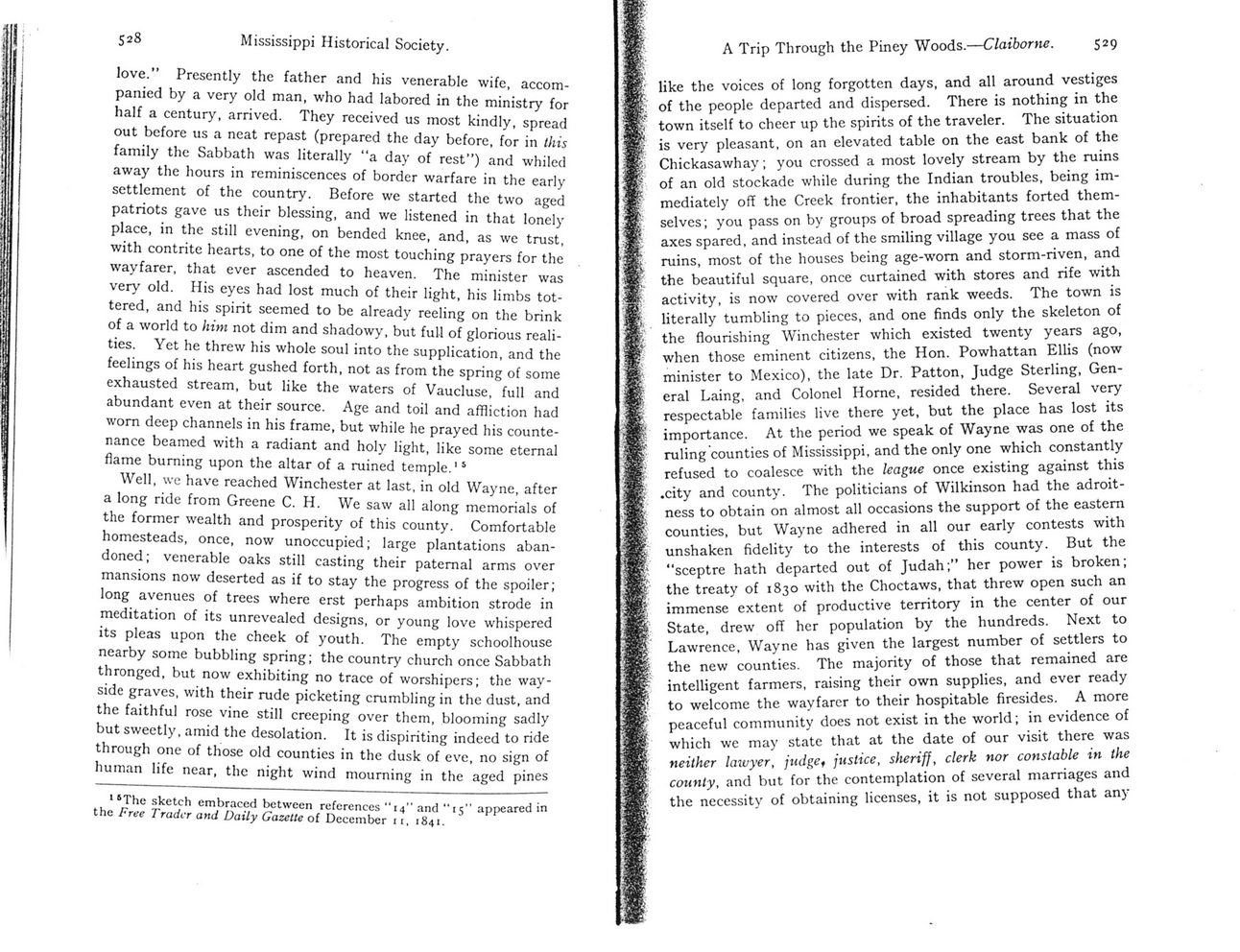This text was obtained via automated optical character recognition.
It has not been edited and may therefore contain several errors.
528 Mississippi Historical Society. love.? Presently the father and his venerable wife, accompanied by a very old man, who had labored in the ministry for half a century, arrived. They received us most kindly, spread out before us a neat repast (prepared the day before, for in this family the Sabbath was literally ?a day of rest?) and whiled away the hours in reminiscences of border warfare in the early settlement of the country. Before we started the two aged patriots gave us their blessing, and we listened in that lonely place, in the still evening, on bended knee, and, as we trust, with contrite hearts, to one of the most touching prayers for the wayfarer, that ever ascended to heaven. The minister was very old. His eyes had lost much of their light, his limbs tottered, and his spirit seemed to be already reeling on the brink of a world to him not dim and shadowy, but full of glorious realities. Yet he threw his whole soul into the supplication, and the feelings of his heart gushed forth, not as from the spring of some exhausted stream, but like the waters of Vaucluse, full and abundant even at their source. Age and toil and affliction had worn deep channels in his frame, but while he prayed his countenance beamed with a radiant and holy light, like some eternal flame burning upon the altar of a ruined temple.15 Well, we have reached Winchester at last, in old Wayne, after a long ride from Greene C. H. We saw all along memorials of the former wealth and prosperity of this county. Comfortable homesteads, once, now unoccupied; large plantations abandoned; venerable oaks still casting their paternal arms over mansions now deserted as if to stay the progress of the spoiler; long avenues of trees where erst perhaps ambition strode in meditation of its unrevealed designs, or young love whispered its pleas upon the cheek of youth. The empty schoolhouse nearby some bubbling spring; the country church once Sabbath thronged, but now exhibiting no trace of worshipers; the wayside graves, with their rude picketing crumbling in the dust, and the faithful rose vine still creeping over them, blooming sadly but sweetly, amid the desolation. It is dispiriting indeed to ride through one of those old counties in the dusk of eve, no sign of human life near, the night wind mourning in the aged pines 1 6The sketch embraced between references ?14" and "15? appeared in the Free Trader and Daily Gazette of December 1 r, 1841. A Trip Through the Piney Woods.?Claiborne. 529 like the voices of long forgotten days, and all around vestiges of the people departed and dispersed. There is nothing in the town itself to cheer up the spirits of the traveler. The situation is very pleasant, on an elevated table on the east bank of the Chickasawhay; you crossed a most lovely stream by the ruins of an old stockade while during the Indian troubles, being immediately off the Creek frontier, the inhabitants forted themselves; you pass on by groups of broad spreading trees that the axes spared, and instead of the smiling village you see a mass of ruins, most of the houses being age-worn and storm-riven, and the beautiful square, once curtained with stores and rife with activity, is now covered over with rank weeds. The town is literally tumbling to pieces, and one finds only the skeleton of the flourishing Winchester which existed twenty years ago, when those eminent citizens, the Hon. Powhattan Ellis (now minister to Mexico), the late Dr. Patton, Judge Sterling, General Laing, and Colonel Horne, resided there. Several very respectable families live there yet, but the place has lost its importance. At the period we speak of Wayne was one of the ruling counties of Mississippi, and the only one which constantly refused to coalesce with the league once existing against this .city and county. The politicians of Wilkinson had the adroitness to obtain on almost all occasions the support of the eastern counties, but Wayne adhered in all our early contests with unshaken fidelity to the interests of this county. But the ?sceptre hath departed out of Judah;? her power is broken; the treaty of 1830 with the Choctaws, that threw open such an immense extent of productive territory in the center of our State, drew off her population by the hundreds. Next to Lawrence, Wayne has given the largest number of settlers to the new counties. The majority of those that remained are intelligent farmers, raising their own supplies, and ever ready to welcome the wayfarer to their hospitable firesides. A more peaceful community does not exist in the world ; in evidence of which we may state that at the date of our visit there was neither lawyer, judge, justice, sheriff, clerk nor constable in the county, and but for the contemplation of several marriages and the necessity of obtaining licenses, it is not supposed that any

Claiborne, J.F.H Claiborne-J.F.H-032